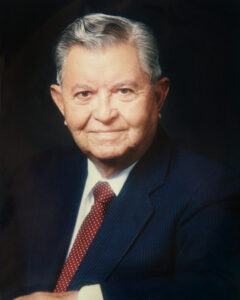Benjamín Cantú
Bishop President (1950 – 1963)

Apostolic Presidents
A Bilingual Church
Benjamín Cantú (1913 – 1998) was the fourth Bishop President of the Apostolic Assembly. He was the first Bishop President born in the United States. Cantú was born in a Methodist family on February 20, 1913, and was a zealous Trinitarian preacher until he was filled with the Holy Spirit to his surprise at an Apostolic service. Minister José Guerra baptized him in 1931. His pastoral ministry began in Mission, Texas and his wife was our sister Tomasita Saenz whom he married in 1935. During these first years, he rose as the natural leader of South Texan Apostolic churches and in 1933 he connected these churches with the “Iglesia Apostólica”. In 1937 he led these Texan churches to work with their counterparts in California. He was appointed Elder for all the state of Texas. Bishop Cantú was a gifted preacher, eloquently commanding both English and Spanish.
Toward New Horizons
At the death of Pioneer Bernardo Hernández, he succeeded him as General Secretary. Being an effective administrator, the pastors elected him Bishop President in 1950. The hallmarks of his presidency include the creation and expansion of the Apostolic Assembly’s missionary program, the Department of Christian Education, and the first Expositors. Bishop Cantú composed “Cristo es Nuestro Jefe,” and “El Pionero Predicador.” He died July 28, 1998, as Pastor of Emmanuel Apostolic Church, a church he began in downtown Los Angeles.
Quick Links
A new commandment I give unto you, That ye love one another; as I have loved you, that ye also love one another. By this shall all men know that ye are my disciples, if ye have love one to another.
Then Peter said unto them, Repent, and be Baptized every one of you in the Name of Jesus Christ for the remission of sins, and ye shall receive the gift of the Holy Ghost.
For God so loved the world, that He gave his only begotten Son, that whosoever believeth in him should not perish, but have everlasting life.










